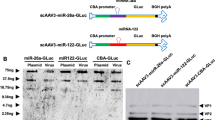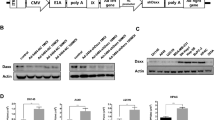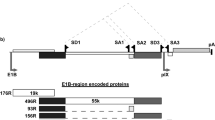Abstract
Reduced expression in immortalized cells (REIC)/dickkopf-3 (Dkk-3), a tumor suppressor gene, is downregulated in various cancers. We previously reported the tumor-inhibitory effects of the REIC/Dkk-3 gene, delivered by a conventional adenoviral vector (Ad-CAG-REIC) in pancreatic cancer. Here, we developed an Ad-REIC vector with a novel gene expression system, termed the super gene expression (SGE) system, and assessed its therapeutic effects relative to those of Ad-CAG-REIC in pancreatic cancer cells. Human pancreatic cancer cell lines ASPC1 and MIAPaCa2 were used. REIC/Dkk-3 expression was assessed by western blot analysis. Relative cell viability and apoptotic effects were examined in vitro. The anti-tumor effects of Ad-REIC treatment were assessed in the mouse xenograft model. Compared with Ad-CAG-REIC, Ad-SGE-REIC elicited a significant increase in REIC protein expression in the cells studied. Relative to Ad-CAG-REIC, Ad-SGE-REIC reduced cell viability and induced apoptosis in the ASPC1 and MIAPaCa2 cell lines in vitro, and achieved superior tumor growth inhibition in the mouse xenograft model. Compared with conventional Ad-REIC agents, Ad-SGE-REIC provided enhanced inhibitory effects against tumor growth. Our results indicate that Ad-SGE-REIC is an innovative therapeutic tool for pancreatic cancer.
This is a preview of subscription content, access via your institution
Access options
Subscribe to this journal
Receive 12 print issues and online access
$259.00 per year
only $21.58 per issue
Buy this article
- Purchase on Springer Link
- Instant access to full article PDF
Prices may be subject to local taxes which are calculated during checkout





Similar content being viewed by others
References
Werner J, Combs SE, Springfeld C, Hartwig W, Hackert T, Buchler MW . Advanced-stage pancreatic cancer: therapy options. Nat Rev Clin Oncol 2013; 10: 323–333.
Siegel R, Naishadham D, Jemal A . Cancer statistics. 2013 CA Cancer J Clin 2013; 63: 11–30.
Salman B, Zhou D, Jaffee EM, Edil BH, Zheng L . Vaccine therapy for pancreatic cancer. Oncoimmunology 2013; 2: e26662.
Soares KC, Zheng L, Edil B, Jaffee EM . Vaccines for pancreatic cancer. Cancer J 2012; 18: 642–652.
Hamada T, Nakai Y, Yasunaga H, Isayama H, Matsui H, Takahara N et al. Prognostic nomogram for nonresectable pancreatic cancer treated with gemcitabine-based chemotherapy. Br J Cancer 2014; 110: 1943–1949.
Saif MW . Controversies in the adjuvant treatment of pancreatic adenocarcinoma. JOP 2007; 8: 545–552.
Kanada M, Fujii T, Takami H, Suenaga M, Inokawa Y, Yamada S et al. The combination of the serum carbohydrate antigen 19-9 and carcinoembryonic antigen is a simple and accurate predictor of mortality in pancreatic cancer patients. Surg Today 2014; 44: 1692–1701.
Cunningham D, Chau I, Stocken DD, Valle JW, Smith D, Steward W et al. Phase III randomized comparison of gemcitabine versus gemcitabine plus capecitabine in patients with advanced pancreatic cancer. J Clin Oncol 2009; 27: 5513–5518.
Tsuji T, Miyazaki M, Sakaguchi M, Inoue Y, Namba M . A REIC gene shows down-regulation in human immortalized cells and human tumor-derived cell lines. Biochem Biophys Res Commun 2000; 268: 20–24.
Uchida D, Shiraha H, Kato H, Nagahara T, Iwamuro M, Kataoka J et al. Potential of adenovirus-mediated REIC/Dkk-3 gene therapy for use in the treatment of pancreatic cancer. J Gastroenterol Hepatol 2014; 29: 973–983.
Nozaki I, Tsuji T, Iijima O, Ohmura Y, Andou A, Miyazaki M et al. Reduced expression of REIC/Dkk-3 gene in non-small cell lung cancer. Int J Oncol 2001; 19: 117–121.
Kurose K, Sakaguchi M, Nasu Y, Ebara S, Kaku H, Kariyama R et al. Decreased expression of REIC/Dkk-3 in human renal clear cell carcinoma. J Urol 2004; 171: 1314–1318.
Abarzua F, Sakaguchi M, Takaishi M, Nasu Y, Kurose K, Ebara S et al. Adenovirus-mediated overexpression of REIC/Dkk-3 selectively induces apoptosis in human prostate cancer cells through activation of c-Jun-NH2-kinase. Cancer Res 2005; 65: 9617–9622.
Kashiwakura Y, Ochiai K, Watanabe M, Abarzua F, Sakaguchi M, Takaoka M et al. Down-regulation of inhibition of differentiation-1 via activation of activating transcription factor 3 and Smad regulates REIC/Dickkopf-3-induced apoptosis. Cancer Res 2008; 68: 8333–8341.
Mizobuchi Y, Matsuzaki K, Kuwayama K, Kitazato K, Mure H, Kageji T et al. REIC/Dkk-3 induces cell death in human malignant glioma. Neuro Oncol 2008; 10: 244–253.
Kawasaki K, Watanabe M, Sakaguchi M, Ogasawara Y, Ochiai K, Nasu Y et al. REIC/Dkk-3 overexpression downregulates P-glycoprotein in multidrug-resistant MCF7/ADR cells and induces apoptosis in breast cancer. Cancer Gene Ther 2009; 16: 65–72.
Wanatabe M, Nasu Y, Kumon H . Adenovirus-mediated REIC/Dkk-3 gene therapy: development of an autologous cancer vaccination therapy (review). Oncol Lett 2014; 7: 595–601.
Kumon H, Sasaki K, Ariyoshi Y, Sadahira T, Ebara S, Hiraki T et al. Ad-REIC gene therapy: promising results in a patient with metastatic CRPC following chemotherapy. Clin Med Insights Oncol 2015; 9: 31–38.
Watanabe M, Sakaguchi M, Kinoshita R, Kaku H, Ariyoshi Y, Ueki H et al. A novel gene expression system strongly enhances the anticancer effects of a REIC/Dkk-3-encoding adenoviral vector. Oncol Rep 2014; 31: 1089–1095.
Niwa H, Yamamura K, Miyazaki J . Efficient selection for high-expression transfectants with a novel eukaryotic vector. Gene 1991; 108: 193–199.
Araki K, Araki M, Miyazaki J, Vassalli P . Site-specific recombination of a transgene in fertilized eggs by transient expression of Cre recombinase. Proc Natl Acad Sci USA 1995; 92: 160–164.
Xu ZL, Mizuguchi H, Ishii-Watabe A, Uchida E, Mayumi T, Hayakawa T et al. Optimization of transcriptional regulatory elements for constructing plasmid vectors. Gene 2001; 272: 149–156.
Xu ZL, Mizuguchi H, Ishii-Watabe A, Uchida E, Mayumi T, Hayakawa T . Strength evaluation of transcriptional regulatory elements for transgene expression by adenovirus vector. J Control Release 2002; 81: 155–163.
Sakaguchi M, Kataoka K, Abarzua F, Tanimoto R, Watanabe M, Murata H et al. Overexpression of REIC/Dkk-3 in normal fibroblasts suppresses tumor growth via induction of interleukin-7. J Biol Chem 2009; 284: 14236–14244.
Niccolai E, Prisco D, D’Elios MM, Amedei A . What is recent in pancreatic cancer immunotherapy? Biomed Res Int 2012; 2013: 492372.
Kitami CE, Kurosaki I, Kawachi Y, Nihei K, Tsuchiya Y, Nomura T et al. Portal vein infusion chemotherapy with gemcitabine after surgery for pancreatic cancer. Surg Today 2013; 43: 33–39.
Hecht JR, Bedford R, Abbruzzese JL, Lahoti S, Reid TR, Soetikno RM et al. A phase I/II trial of intratumoral endoscopic ultrasound injection of ONYX-015 with intravenous gemcitabine in unresectable pancreatic carcinoma. Clin Cancer Res 2003; 9: 555–561.
Block A, Chen SH, Kosai K, Finegold M, Woo SL . Adenoviral-mediated herpes simplex virus thymidine kinase gene transfer: regression of hepatic metastasis of pancreatic tumors. Pancreas 1997; 15: 25–34.
Aoki K, Yoshida T, Matsumoto N, Ide H, Hosokawa K, Sugimura T et al. Gene therapy for peritoneal dissemination of pancreatic cancer by liposomemediated transfer of herpes simplex virus thymidine kinase gene. Hum Gene Ther 1997; 8: 1105–1113.
Makinen K, Loimas S, Wahlfors J, Alhava E, Jänne J . Evaluation of herpes simplex thymidine kinase mediated gene therapy in experimental pancreatic cancer. J Gene Med 2000; 2: 361–367.
Makower D, Rozenblit A, Kaufman H, Edelman M, Lane ME, Zwiebel J et al. Phase II clinical trial of intralesional administration of the oncolytic adenovirus ONYX-015 in patients with hepatobiliary tumors with correlative p53 studies. Clin Cancer Res 2003; 9: 693–702.
Kasuya H, Takeda S, Nomoto S, Nakao A . The potential of oncolytic virus therapy for pancreatic cancer. Cancer Gene Ther 2005; 12: 725–736.
Yamamura K, Kasuya H, Sahin TT, Tan G, Hotta Y, Tsurumaru N et al. Combination treatment of human pancreatic cancer xenograft models with the epidermal growth factor receptor tyrosine kinase inhibitor erlotinib and oncolytic herpes simplex virus HF10. Ann Surg Oncol 2014; 21: 691–698.
Watanabe M, Kashiwakura Y, Huang P, Ochiai K, Futami J, Li SA et al. Immunological aspects of REIC/Dkk-3 in monocyte differentiation and tumor regression. Int J Oncol 2009; 34: 657–663.
Nakao A, Kasuya H, Sahin TT, Nomura N, Kanzaki A, Misawa M et al. A phase I dose-escalation clinical trial of intraoperative direct intratumoral injection of HF10 oncolytic virus in non-resectable patients with advanced pancreatic cancer. Cancer Gene Ther 2011; 18: 167–175.
Livraghi T, Baietta E, Matricardi L, Villa E, Lovati R, Vettori C . Fine needle percutaneous intratumoral chemotherapy under ultrasound guidance: a feasibility study. Tumori 1986; 72: 81–87.
Acknowledgements
This work was supported by JSPS KAKENHI Grant Number 24590977. Momotaro-Gene holds the patents for the REIC/DKK3 agent and develops the agent as a cancer therapeutic.
Author information
Authors and Affiliations
Corresponding author
Ethics declarations
Competing interests
MW, MS, YN and HK own stocks in Momotaro-Gene. The remaining authors declare no conflict of interest.
Rights and permissions
About this article
Cite this article
Sawahara, H., Shiraha, H., Uchida, D. et al. Novel REIC/Dkk-3-encoding adenoviral vector as a promising therapeutic agent for pancreatic cancer. Cancer Gene Ther 23, 278–283 (2016). https://doi.org/10.1038/cgt.2016.31
Received:
Revised:
Accepted:
Published:
Issue Date:
DOI: https://doi.org/10.1038/cgt.2016.31



